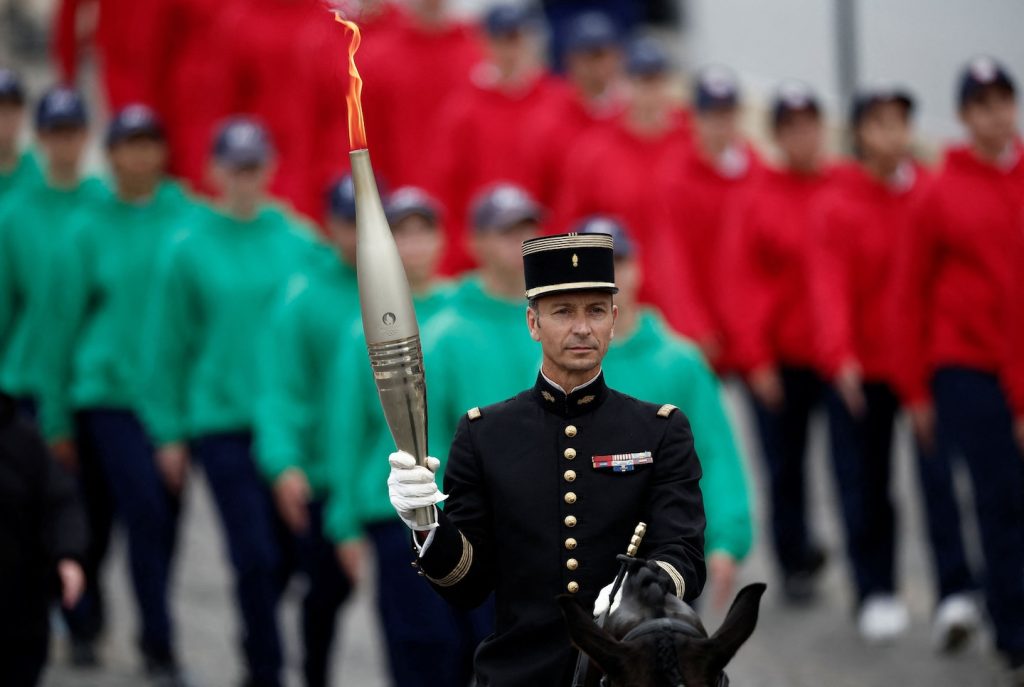The Place de la Concorde, where the Bastille Day procession traditionally ends, has been closed in recent weeks for the construction of temporary Olympic stadiums. As a result, the parade had to be moved to the Avenue Foch, one of the shorter and less well-known roads that surround the Arc de Triomphe.
While the festivities usually draw tens of thousands of people and can be easily accessed, authorities limited the number of spectators this year to 6,200, who — amid space constraints and security concerns — were required to sign up in advance. Preparations for the Olympics have strained police resources in France, which also limited the number of law enforcement officers marching in Sunday’s parade.
Organizers maintained the traditional air show. Jets sprayed blue, white and red smoke — the colors of the French flag — into the clouded sky above Paris.
The display of tanks and planes is usually the centerpiece of the annual parade, which on Sunday also marked the 80th anniversary of the country’s liberation from the Nazis. But the star of this year’s festivities was the Olympic flame. Riding a horse, Col. Thibaut Vallette, an equestrian gold medalist at the 2016 Olympic Games, carried the torch down the avenue.
After the parade ended, the flame continued its journey through central Paris, where tickets were not necessary to watch the festivities. Marie Niro, 27, saw it pass near the National Assembly, the lower house of Parliament. “It’s a moment that we share, a moment that unites us,” she said.
Armored vehicles on display for Bastille Day were positioned just a few feet from the temporary Olympic venue that has been built on the Place des Invalides; at a nearby recruiting event for the military, young Parisians mingled with tourists.
Mixing France’s military parade with the arrival of the Olympic flame was “atypical,” Niro acknowledged.
“But we preserve our traditions,” she said.
The Olympic torch will travel around the capital region and surrounding areas over the coming days before making its way back to the city center on July 26, the day of the Opening Ceremonies on the Seine.
Sunday is the anniversary of the storming of the Bastille fortress in Paris on July 14, 1789, which marked the beginning of the French Revolution that toppled the monarchy. The occasion is celebrated with events across France each year, and the Paris military parade and fireworks at the Eiffel Tower are viewed as the highlights of the day.
Sunday’s ceremonies were attended by President Emmanuel Macron, who was accompanied by members of his cabinet, including Prime Minister Gabriel Attal.
Only a week ago, it appeared possible that Macron might be forced to share power with a far-right prime minister. But legislative elections in France last Sunday resulted instead in political gridlock, with no party or alliance having gained an outright majority in the National Assembly.
Attal, who offered to step down Monday in the wake of the election, was asked by Macron to stay on for “the stability of the country.”
Macron now faces the prospect of a heavily diminished mandate, but has sought to portray himself as going about business as usual. Last week, he attended the NATO summit in Washington.
Security remains a paramount concern for the organizers of this year’s Olympic Games. The Israel-Gaza war has prompted bomb scares, a rise in antisemitic incidents and a renewed fear of radicalization here. Tensions with Russia over its war in Ukraine — and the related bans on the Russian and Belarusian athlete delegations — have elevated the risk of cyberattacks, French officials said.
Interior Minister Gérald Darmanin said Saturday that 3,570 people have been excluded from attending the Olympics, including “dozens of radical individuals close to Islamist, ultra-left and ultra-right circles.”
French authorities said earlier this year that they were aiming to have screened over 1 million people by the time the Games begin, including coaches, athletes, volunteers and participants in events such as Sunday’s military parade. So far, 770,000 people have been screened, Darmanin said Saturday.
Annabelle Timsit contributed to this report.
